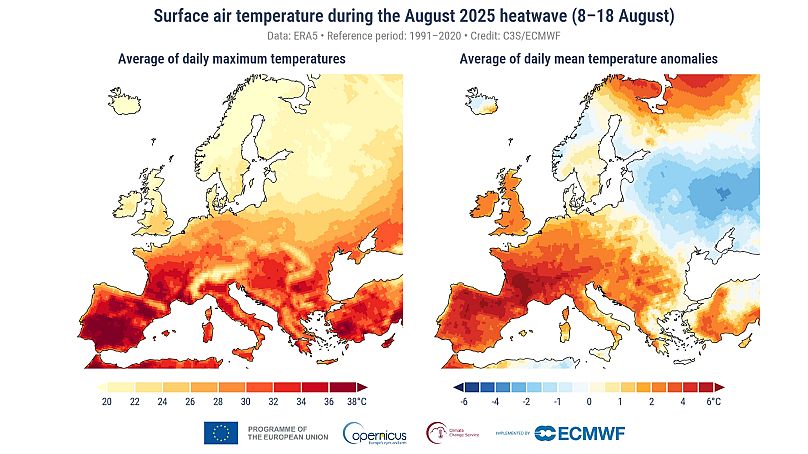
This August was the world’s third-warmest August on record, according to the EU’s Copernicus Climate Change Service (C3S).
Temperatures were 0.49°C above the 1991 to 2020 average for the month. C3S data shows that August 2025 was 0.22°C cooler than the two warmest Augusts on record in 2023 and 2024.
Compared to the pre-industrial level, last month was 1.29°C warmer. And C3S says the last 12 months, from September 2024 to August 2025, have been 0.64°C above the 1991 to 2020 average and 1.53°C above the pre-industrial level.
Overall, this summer has been the world’s third warmest on record, at 0.47°C above the 1991 to 2020 average. It was only cooler than the summers of 2023 and 2024.
August brings the southwest Europe’s third major heatwave
At an average of 19.46°C, August in Europe was 0.3°C above average this year. This puts it outside of the continent’s 10 warmest Augusts in Copernicus’s data records.
But there were still some hotspots. The Iberian Peninsula and southwest France were particularly affected by heatwave conditions.
“In southwest Europe, the month brought the third major heatwave of the summer, accompanied by exceptional wildfires,” said Samantha Burgess, Strategic Lead for Climate at European Centre for Medium-Range Weather Forecasts (ECMWF).

More than a million hectares of land have gone up in flames across Europe so far this year, an area larger than Cyprus.
In Spain, almost 400,000 hectares of land have burned since January, according to the Copernicus European Forest Fire Information System (EFFIS). More than 260,000 hectares have burned in Portugal.
A rapid analysis by World Weather Attribution found that hot, dry and windy conditions, which fuelled these fires, were made more likely and more intense by climate change.
Overall, Europe has seen its fourth warmest summer season on record at 0.9°C above the 1991 to 2020 average. Summer temperatures were above average across almost all of the continent. The only exception was some parts of Eastern Europe.
The season also brought drier-than-average conditions in much of the western and southern parts of the continent, as well as in the Balkans and Black Sea regions, and in parts of Scandinavia, Finland and northwestern Russia.
The world’s oceans are unusually warm
The average sea surface temperature (SST) across most of the world’s oceans was 20.82°C – the third highest value on record.
Most of the North Pacific saw much above-average SSTs, with record highs reached in some areas.
“With the world’s ocean also remaining unusually warm, these events underline not only the urgency of reducing emissions but also the critical need to adapt to more frequent and intense climate extremes,” Burgess said.
In Europe, August was a more mixed picture. While sea surface temperatures were much less extreme than in 2024 across the Mediterranean, record highs continued in August across an area of the North Atlantic to the west of France and the UK.